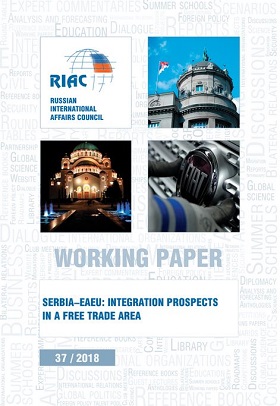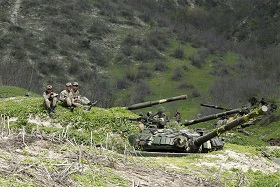The study of international relations has historically focused on the activities of large and powerful states and considered new countries in the post-Socialist region to be geopolitical anomalies resulting from a fight between the West and Russia. Partially recognized states — Kosovo, Abkhazia, and South-Ossetia — are regarded neither as a full part of the international system nor as sustainable enough to fulfil the Montevideo Convention requirements.
With the diplomatic recognition of Kosovo by the United States on February 18, 2008, Moscow decided to follow the American example and recognize Abkhazia and South Ossetia on August 26, 2008. Instead of supporting Russia’s diplomatic recognition, Washington opposed the recognition of Abkhazia and South-Ossetia. Essentially, Russia opposed the recognition of Kosovo.
The emergence of a de facto autonomous Crimea and Donbas in 2014 / 2015 and the proliferation of unrecognized and partially recognized territories provided a significant challenge to international organizations such as the European Union, NATO, and the Eurasian Economic Union. This article explains why Moscow, Washington and Brussels decided to recognize new countries à la carte instead of applying the Montevideo Convention.
Both Russia and Georgia should re-think the macroeconomic strategy in Abkhazia and South-Ossetia. Georgia might not be ready to recognize the territories but could instead study the interesting case of the People’s Republic of China and its relationship with Hong-Kong/Macao before 1997/1999 (reintegration of Hong-Kong and Macao into the People’s Republic of China).
Beijing has managed to successfully establish economic ties with Hong-Kong and Macao during the '80s/'90s, and Georgia could apply a similar approach to Abkhazia and South-Ossetia. Such a strategy could unleash the economic potential of Abkhazia. Moreover, re-opening the train line between Tbilisi and Moscow would develop the Russian Caucasus, Abkhazia, and Georgia.
Looking at the Chinese handover of Hong-Kong and Macao, Georgia might succeed in re-integrating or implementing a Federal/Confederal system with Abkhazia and South-Ossetia. The same could apply to Serbia in Kosovo.
Western states and Russia have failed to develop a sustainable dialogue regarding partially recognized states in the post-Socialist order, contrary to Beijing in Southern Asia. Tensions remain between Taiwan and Beijing, although economic cooperation has been and still is the primary driver of the China-Taiwan relationship. Georgia and Serbia could learn from such an experience.
The study of international relations has historically focused on the activities of large and powerful states and considered new countries in the post-Socialist region to be geopolitical anomalies resulting from a fight between the West and Russia. Partially recognized states — Kosovo, Abkhazia, and South-Ossetia — are regarded neither as a full part of the international system nor as sustainable enough to fulfil the Montevideo Convention requirements.
With the diplomatic recognition of Kosovo by the United States on February 18, 2008, Moscow decided to follow the American example and recognize Abkhazia and South Ossetia on August 26, 2008. Instead of supporting Russia’s diplomatic recognition, Washington opposed the recognition of Abkhazia and South-Ossetia. Essentially, Russia opposed the recognition of Kosovo.
The emergence of a de facto autonomous Crimea and Donbas in 2014/2015 and the proliferation of unrecognized and partially recognized territories provided a significant challenge to international organizations such as the European Union, NATO, and the Eurasian Economic Union. This article explains why Moscow, Washington and Brussels decided to recognize new countries à la carte instead of applying the Montevideo Convention.
Ostrich diplomacy
According to International law, European law and Russian law, members of international organizations must be recognized states. In such a context, the debate regarding the future of Kosovo, Abkhazia and South-Ossetia remains frozen due to the dialogue between Moscow and the West (Washington, and Brussels). Both sides are more focused on their respective geopolitical interest than the reality on the ground.
From the Russian perspective, the presence of Russian peacekeepers in the Southern Caucasus territories is a way to ensure the safety of ethnic minorities and preserve local cultures from Georgian nationalists. From the Western perspective, it is more about Russia having outposts in Georgia to slow down the integration process of Georgia in the European Union and NATO Command Structures.
Both arguments are relevant, while Russia is ensuring the safety of Abkhazia and South-Ossetia, it also takes advantage of the geo-strategic location to increase Moscow's smart power in the whole Black Sea region. However, the United-States and the European Union are naïve to assume Georgia would be ready to re-integrate Abkhazia and South-Ossetia peacefully and should keep in mind the 1992 and 2008 politico-military crisis.
From a humanitarian perspective, and contrary to Kosovo, inhabitants of Abkhazia and South-Ossetia must rely on a second citizenship (often Russian) to travel, study abroad, and enjoy the same rights as people coming from recognized countries. The debate regarding the difficulties for inhabitants in Abkhazia and South-Ossetia usually occurs after the talks on European security, and both the West and Russia tend to forget the daily struggle of people living in partially recognized states.
While the United-States and the European Union have adopted “Ostrich diplomacy” — denying reality in Abkhazia and South-Ossetia, — Russia has done the same in Kosovo. Moscow is ready to support the diplomatic recognition of two new states in the tormented post-Soviet Caucasus and the West to recognize an independent Kosovo in an unstable former-Yugoslavia.
Overall, Washington and Brussels should be more careful when it comes to Georgia’s motivation to join the European Union and NATO. Tbilisi has been looking for military support from the West to take back separatist territories and does not share Western interests (e.g. Tbilisi refused to recognize Kosovo).
Moscow should also be cautious when it comes to its bilateral relationship with Serbia. Belgrade is seeking support from Russia — and more recently from the People’s Republic of China — to counterbalance American and European soft power in Kosovo and does not support Moscow’s views regarding Abkhazia and South-Ossetia.
Geopolitics versus International Law
The Montevideo Convention on the Rights and Duties of States, signed in 1933, states: “the state as a person of international law should possess the following qualifications: (a) a permanent population; (b) a defined territory; (c) government; and (d) capacity to enter into relations with the other states.” According to this definition, most, if not all, de facto states can ask for international recognition.
The main obstacle, nonetheless, remains the “capacity to enter into relations with the other parties” as it includes a will from the already recognized states to welcome a new country to the international community. In such context, most of the unrecognized states are struggling to ask for diplomatic recognition, and it took decades for the People's Republic of China — one of the most populated countries in the world and de facto state after 1949 — to be recognized by Western countries (e.g. the United-States of America recognized the People’s Republic of China in 1979).
Diplomatic recognition is not always related to the reality on the ground, and Great Powers are mostly doing it à la carte to defend geopolitical interests. The United-States recognized Kosovo to weaken Serbia and diminish Russian influence in the Balkans. A few months later, Moscow recognized Abkhazia and South-Ossetia to reduce Western influence in the Southern Caucasus.
If it were about International law and the Montevideo Convention, Russia would have also recognized Transnistria or Nagorno-Karabakh, and Western countries would have recognized other territories in the post-Socialist space instead of only pro-Western Kosovo.
Spain — a member of the European Union and a NATO member state — is the only country in Western Europe that has not recognized Kosovo. This was initially because of objections to the legality of its unilateral declaration of independence under international law, and also due to concerns about possible implications of national independence movements. Spanish diplomatic reluctance underlines that recognition is correlated to domestic interests.
Georgia — a pro-Western country — should logically support the recognition of Kosovo to backup the United-Sates and the European Union. On May 9, 2008, the President of Georgia, Mikheil Saakashvili, said "We are saying loud and clear that we have never planned to recognize Kosovo. Nor do we plan to do so in the future. The way out of the situation that has been chosen is not the best one. The Serbs should have been given more time for negotiations. The solution for Kosovo was a hasty one. ”
Macroeconomics, a weak argument against the recognition of Kosovo, Abkhazia and South-Ossetia
Often used against the diplomatic recognition of Kosovo, Abkhazia and South-Ossetia, the macroeconomic viability of new states is debatable. Kosovo is a territory of 10 908 square km with 1,9 million inhabitants, Abkhazia — 8 653 square km with 240 705 inhabitants, and South-Ossetia – 3 900 square km with 51 547 inhabitants.
According to Serbia and Georgia, the three territories are too small to be sustainable from an economic perspective. In practice, Kosovo is relying on humanitarian support from Western states, and Abkhazia and South-Ossetia would collapse without the help of Russian tourists (Abkhazia) and financial support from Moscow.
However, the argument based on the size of the territories is rather weak. One of the most prosperous countries in the world with a GDP of $70 billion — the Grand Duchy of Luxembourg — is only 2,586 km2 (less than South-Ossetia). Moreover, Luxembourg had less than 200,000 citizens after the Second World War (less than Abkhazia) and nowadays around 650,000 (less than Kosovo).
Finally, unrecognized states have macroeconomic potential. Abkhazia was once a prosperous territory in the Soviet Union with developed tourism infrastructure, as well as thriving wine, tea and mandarine industries. The Sukhum/i airport was also able to welcome space shuttles. South-Ossetia has always been famous for vacation houses and Ossetians are used to working in North-Ossetia and Tbilisi before coming back to their homes during Summer. Kosovo has also been able to develop in Yugoslavia without any difficulties.
Overall, the macroeconomic argument is debatable because of the lack of recognition which hinders economic development. A fully recognized Abkhazia could enjoy the benefits of a train connection between Moscow and Tbilisi, becoming a Hong-Kong/Luxembourg in the Black Sea with a relevant fiscal policy to attract Russian and Georgian investors. The location for tea and wine industry, hydropower and renewable energy (photovoltaic solar panels and windmills), as well as tourism, is an unexploited asset.
South-Ossetia will have more difficulties guaranteeing sustainability and will probably need to rely on the parent state to provide financial help, or at least to be integrated into the rest of Ossetia.
Kosovo could develop using its wine industry and minerals and the proximity with the European Union, especially the Germano-Austrian market.
A Chinese model of governance in the Caucasus and former-Yugoslavia?
Both Russia and Georgia should re-think the macroeconomic strategy in Abkhazia and South-Ossetia. Georgia might not be ready to recognize the territories but could instead study the interesting case of the People’s Republic of China and its relationship with Hong-Kong/Macao before 1997/1999 (reintegration of Hong-Kong and Macao into the People’s Republic of China).
Beijing has managed to successfully establish economic ties with Hong-Kong and Macao during the '80s/'90s, and Georgia could apply a similar approach to Abkhazia and South-Ossetia. Such a strategy could unleash the economic potential of Abkhazia. Moreover, re-opening the train line between Tbilisi and Moscow would develop the Russian Caucasus, Abkhazia, and Georgia.
Looking at the Chinese handover of Hong-Kong and Macao, Georgia might succeed in re-integrating or implementing a Federal/Confederal system with Abkhazia and South-Ossetia. The same could apply to Serbia in Kosovo.
Western states and Russia have failed to develop a sustainable dialogue regarding partially recognized states in the post-Socialist order, contrary to Beijing in Southern Asia. Tensions remain between Taiwan and Beijing, although economic cooperation has been and still is the primary driver of the China-Taiwan relationship. Georgia and Serbia could learn from such an experience.








